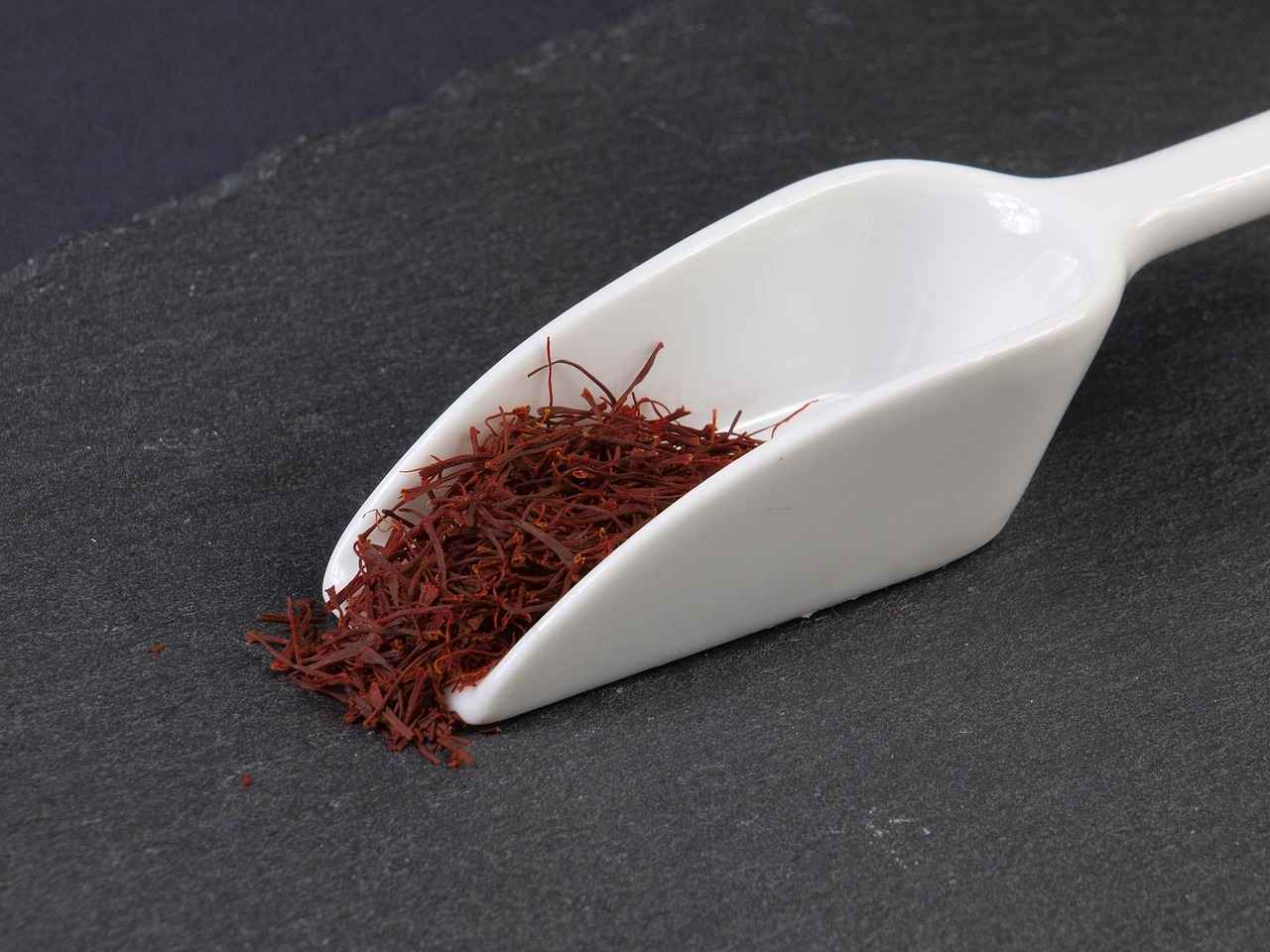This article delves into the scientifically-backed benefits of saffron supplements for mood enhancement, exploring their mechanisms, effectiveness, and practical applications for mental well-being.
What is Saffron and How Does It Work?
Saffron, derived from the Crocus sativus flower, has a rich history in traditional medicine. It is known for its vibrant color and unique flavor, but its therapeutic properties are equally noteworthy. The active compounds in saffron, particularly crocin and safranal, play a crucial role in influencing mood and emotional health by modulating neurotransmitters like serotonin and dopamine.
The Science Behind Saffron’s Mood-Boosting Properties
Research indicates that saffron may alleviate symptoms of depression and anxiety. Key studies have shown that individuals taking saffron supplements reported significant improvements in mood compared to those on placebo. The mechanisms behind these effects include the antioxidant properties of crocin and the neuroprotective effects of safranal.
Clinical Studies on Saffron and Mood Enhancement
Numerous clinical trials have validated saffron’s effectiveness in treating mood disorders. A systematic review of these studies indicates that saffron is comparable to conventional antidepressants, with fewer side effects. This demonstrates saffron’s potential as a natural alternative for mood enhancement.
Dosage and Administration of Saffron Supplements
Understanding the appropriate dosage is crucial for maximizing saffron’s benefits. The typical dosage ranges from 30 mg to 200 mg per day, depending on the form of the supplement. It is advisable to consult with a healthcare professional before starting supplementation.
Potential Side Effects and Considerations
While saffron is generally safe, some individuals may experience side effects such as dizziness or nausea. It is essential to consider these potential reactions and to use saffron responsibly.
Comparing Saffron to Other Natural Mood Enhancers
Saffron is not the only natural remedy for mood enhancement. Other popular supplements include St. John’s Wort and omega-3 fatty acids. Each of these has unique benefits, but saffron stands out due to its specific action on mood-regulating neurotransmitters.
How to Incorporate Saffron into Your Diet
Incorporating saffron into your daily routine can be easy and enjoyable. Here are some practical tips:
- Add saffron to rice dishes for a flavorful boost.
- Infuse saffron in warm milk or tea for a soothing beverage.
- Use saffron in desserts to enhance both flavor and health benefits.
Recipes Featuring Saffron
Cooking with saffron can enhance both flavor and health benefits. Here are a couple of delicious recipes:
- Saffron Risotto: Creamy risotto infused with saffron threads.
- Saffron-Infused Chicken: Marinated chicken cooked with saffron for a unique flavor.
Supplement Forms of Saffron
Saffron is available in various forms, including capsules and extracts. Each form has its advantages, with extracts often providing a more concentrated dose.
Conclusion: The Future of Saffron in Mental Health
As research continues to unveil saffron’s potential, its role in mental health may expand. Future studies may explore its long-term effects and optimal dosing strategies, solidifying saffron’s place as a valuable ally in mood enhancement.

What is Saffron and How Does It Work?
Saffron, derived from the Crocus sativus flower, has a rich history in traditional medicine, celebrated for its vibrant color and unique flavor. This remarkable spice has been utilized for centuries not only as a culinary delight but also for its potential health benefits, particularly in enhancing mood and emotional well-being.
The active compounds in saffron, such as crocin and safranal, are believed to play a significant role in influencing mood. These compounds interact with neurotransmitters in the brain, particularly serotonin, which is often referred to as the “feel-good” hormone. By modulating serotonin levels, saffron may help alleviate symptoms of depression and anxiety, contributing to an overall sense of well-being.
Research indicates that saffron’s mood-boosting properties may stem from its ability to act as an antioxidant. This means it helps protect the brain from oxidative stress, which can contribute to mood disorders. Additionally, saffron has been found to enhance the effectiveness of certain antidepressants, making it a valuable adjunct in treatment plans for those struggling with mood disorders.
Furthermore, saffron is thought to promote better sleep quality and reduce feelings of fatigue, both of which are essential for maintaining a positive mood. By incorporating saffron into one’s daily routine, individuals may experience a more balanced emotional state and improved mental health.
In conclusion, saffron is more than just a culinary spice; it is a powerful natural remedy that has been used for centuries to enhance mood and emotional health. Its active compounds offer a promising avenue for those seeking alternative methods to improve their mental well-being.

The Science Behind Saffron’s Mood-Boosting Properties
Saffron, the vibrant spice derived from the Crocus sativus flower, has garnered attention not only for its culinary uses but also for its potential benefits in enhancing mood and emotional well-being. Research indicates that saffron contains several bioactive compounds, notably crocin and safranal, which are believed to play a crucial role in alleviating symptoms associated with depression and anxiety.
Numerous studies have explored the efficacy of saffron in treating mood disorders. For instance, a meta-analysis published in the journal Nutrition Reviews examined multiple clinical trials and found that saffron supplementation significantly reduced depressive symptoms compared to placebo groups. Participants reported notable improvements in mood, suggesting that saffron may be as effective as some conventional antidepressants, but with fewer side effects.
Another pivotal study published in the Journal of Affective Disorders highlighted how crocin works on the brain’s neurotransmitters, particularly serotonin, which is often linked to mood regulation. By enhancing serotonin levels, saffron may help in stabilizing mood and reducing feelings of sadness and anxiety.
Furthermore, the calming effects of safranal have been associated with reduced stress and anxiety levels, making saffron a promising natural alternative for those seeking relief from mental health challenges. Its antioxidant properties also contribute to overall brain health, which is essential for emotional stability.
In conclusion, the science behind saffron’s mood-boosting properties is supported by a growing body of research that underscores its potential as a natural remedy for mental health issues. As more studies emerge, saffron may well become a staple in holistic approaches to enhancing emotional well-being.
Clinical Studies on Saffron and Mood Enhancement
Over the past few decades, a growing body of research has focused on the potential of saffron as a natural remedy for mood disorders. Numerous clinical trials have investigated saffron’s effectiveness in treating conditions such as depression and anxiety, yielding promising results that may have significant implications for mental health treatment.
One of the most notable studies published in the Journal of Affective Disorders found that saffron extract significantly reduced symptoms of depression in participants compared to a placebo. The trial involved a diverse group of individuals and lasted for several weeks, demonstrating that saffron can be a viable option for those seeking alternative treatments for mood disorders.
Another study published in Phytotherapy Research highlighted the positive effects of saffron on anxiety levels. Researchers observed that participants who consumed saffron supplements reported lower levels of anxiety and improved overall emotional well-being. The active compounds in saffron, such as crocin and safranal, are believed to play a crucial role in these mood-enhancing effects by influencing neurotransmitter systems in the brain.
Additionally, a meta-analysis encompassing multiple trials concluded that saffron is effective in reducing depressive symptoms and has a favorable safety profile. This analysis emphasized the importance of dosage, suggesting that a daily intake of 30-50 mg of saffron extract is optimal for mood enhancement.
As the research continues to evolve, the implications of these findings are profound. They suggest that saffron could serve as a complementary treatment for individuals experiencing mood disorders, providing a natural alternative to conventional medications with fewer side effects.
In conclusion, the wealth of clinical evidence supporting saffron’s mood-enhancing properties opens new avenues for mental health treatment. With its rich history and emerging scientific validation, saffron may soon become a staple in holistic approaches to mental well-being.
Dosage and Administration of Saffron Supplements
Understanding the appropriate dosage of saffron is crucial for maximizing its benefits, particularly in the realm of mood enhancement. Saffron, known for its vibrant color and unique flavor, has been recognized for its potential to positively influence emotional well-being. However, to reap these benefits effectively, one must adhere to recommended dosages.
Research suggests that a daily intake of 30 mg to 200 mg of saffron extract can be beneficial for mood improvement. This range is based on various clinical studies that have explored saffron’s effects on symptoms of depression and anxiety. It is important to note that the exact dosage may vary depending on individual factors such as age, weight, and overall health.
| Dosage Range | Potential Benefits |
|---|---|
| 30 mg | May help alleviate mild mood disturbances. |
| 100 mg | Can support emotional balance and reduce anxiety. |
| 200 mg | Potentially effective for moderate depressive symptoms. |
When starting saffron supplementation, it is advisable to begin at the lower end of the dosage range and gradually increase it as needed. This approach allows individuals to monitor their body’s response and minimize any potential side effects. Additionally, it is recommended to consult a healthcare professional before initiating any new supplement regimen, especially for those with existing health conditions or those taking other medications.
Incorporating saffron into your daily routine can also be achieved through culinary methods, such as adding it to dishes or beverages. This not only enhances the flavor but also provides the mood-boosting benefits of saffron in a more enjoyable manner.
In conclusion, understanding the correct dosage of saffron supplements is essential for achieving optimal mood enhancement. By adhering to recommended guidelines and consulting with healthcare providers, individuals can safely explore the potential benefits of this remarkable spice.
Potential Side Effects and Considerations
While saffron is widely recognized for its numerous health benefits, particularly in enhancing mood and emotional well-being, it is essential to be aware of potential side effects associated with its supplementation. Understanding these adverse reactions can help individuals make informed decisions about incorporating saffron into their health regimen.
- Allergic Reactions: Some individuals may experience allergic reactions to saffron, which can manifest as skin rashes, itching, or respiratory issues. It is crucial to monitor any unusual symptoms after starting saffron.
- Gastrointestinal Disturbances: High doses of saffron may lead to digestive issues such as nausea, vomiting, or diarrhea. It is advisable to start with a lower dosage and gradually increase it to assess tolerance.
- Interactions with Medications: Saffron may interact with certain medications, particularly those affecting mood or blood pressure. Consulting a healthcare professional before beginning saffron supplementation is essential for those on medication.
- Pregnancy and Breastfeeding: Pregnant and breastfeeding women should exercise caution with saffron, as high doses can potentially lead to complications. It is best to seek medical advice before use.
- Hormonal Effects: Saffron has been noted to influence hormone levels, which may not be suitable for individuals with specific hormonal conditions. Monitoring and professional guidance are recommended.
Before starting saffron supplementation, it is crucial to consider these potential side effects and consult with a healthcare provider, especially for individuals with pre-existing health conditions or those taking other medications. This proactive approach ensures a safer and more effective experience with saffron, allowing users to enjoy its mood-enhancing benefits while minimizing risks.
Comparing Saffron to Other Natural Mood Enhancers
Saffron, known for its vibrant color and unique flavor, is gaining recognition not only as a culinary delight but also as a natural mood enhancer. However, it is not the only option available. This section explores how saffron compares to other popular supplements such as St. John’s Wort and omega-3 fatty acids, both of which are also widely used for improving mood and emotional well-being.
- Saffron: Derived from the flower of the Crocus sativus, saffron is believed to contain active compounds like crocin and safranal, which have been studied for their potential antidepressant effects. Research indicates that saffron can help alleviate symptoms of depression and anxiety, making it a promising natural remedy.
- St. John’s Wort: This herb has been used for centuries to treat mild to moderate depression. Its efficacy is attributed to hypericin and hyperforin, which may influence neurotransmitters in the brain. However, it is essential to note that St. John’s Wort can interact with various medications, potentially reducing their effectiveness.
- Omega-3 Fatty Acids: Found in fish oil and certain plant sources, omega-3 fatty acids are known for their anti-inflammatory properties and role in brain health. Studies suggest that omega-3 supplementation can improve mood and reduce symptoms of depression, making it a valuable addition to any mood-enhancing regimen.
When comparing these three natural remedies, it is crucial to consider individual needs and potential interactions with other medications. While saffron may offer a unique approach to mood enhancement, St. John’s Wort and omega-3 fatty acids also provide valuable benefits. Consulting with a healthcare professional can help determine the best option based on personal health profiles and specific mood-related concerns.
In conclusion, while saffron stands out for its distinctive properties, it is essential to recognize that it is part of a broader landscape of natural mood enhancers. Each option has its strengths and potential drawbacks, and understanding these can guide individuals toward making informed choices for their mental well-being.

How to Incorporate Saffron into Your Diet
Incorporating saffron into your daily routine can be both simple and enjoyable, allowing you to reap its mood-enhancing benefits effortlessly. Here are some practical tips to help you add saffron to your meals and beverages:
- Add Saffron to Your Morning Beverage: Start your day with a warm cup of saffron-infused tea or milk. Simply steep a few strands of saffron in hot water or milk for about 10 minutes. This not only enhances the flavor but also provides a gentle mood boost to kickstart your day.
- Enhance Your Cooking: Saffron can be a delightful addition to various dishes. Try adding it to rice, soups, or stews. For example, a pinch of saffron in your risotto or paella can elevate the dish’s flavor and provide health benefits.
- Incorporate into Smoothies: Blend saffron into your favorite smoothie recipes. It pairs well with fruits like bananas and mangoes, adding a unique flavor while enhancing your mood.
- Baking with Saffron: When baking, consider adding saffron to cakes or bread. A saffron-infused cake can be a delightful treat that not only tastes good but also supports your mental well-being.
- Use in Marinades: Incorporate saffron into marinades for meats or vegetables. The infusion of saffron can add a rich color and flavor, making your meals more appealing and beneficial.
Experiment with Quantity: When using saffron, remember that a little goes a long way. Start with a small amount and adjust according to your taste preferences. This will ensure you enjoy both the flavor and the potential mood-enhancing effects.
By integrating saffron into your daily meals and drinks, you can easily enjoy its numerous benefits, making your culinary experiences both flavorful and uplifting.
Recipes Featuring Saffron
Cooking with saffron not only elevates the flavor of your dishes but also brings a host of health benefits. This unique spice, known for its vibrant color and distinct aroma, has been cherished for centuries in various cuisines around the world. Here, we present a collection of delicious recipes that showcase saffron’s unique taste while highlighting its mood-boosting properties.
Saffron can be easily integrated into a variety of dishes, from savory to sweet. Below are some innovative recipes that will allow you to experience the full potential of this remarkable spice.
- Saffron Risotto
- Ingredients: Arborio rice, chicken or vegetable broth, onion, garlic, saffron threads, Parmesan cheese, butter.
- Instructions: Sauté onion and garlic in butter, add rice, and gradually stir in broth. Infuse with saffron, cook until creamy, and finish with Parmesan.
- Saffron Chicken Curry
- Ingredients: Chicken pieces, coconut milk, saffron, garlic, ginger, curry powder, vegetables.
- Instructions: Marinate chicken with saffron, garlic, and ginger. Cook with curry powder and coconut milk until tender. Serve with rice.
- Saffron Infused Tea
- Ingredients: Water, saffron threads, honey, lemon.
- Instructions: Steep saffron in hot water, add honey and lemon to taste. Enjoy a soothing cup that uplifts your mood.
- Saffron Pudding
- Ingredients: Milk, sugar, rice, saffron, cardamom.
- Instructions: Cook rice in milk with sugar and cardamom. Stir in saffron for flavor and color, and serve chilled.
By incorporating saffron into your meals, you not only enhance the flavor but also harness its potential to improve your mental well-being. Enjoy these recipes as part of a balanced diet to experience the full benefits of this extraordinary spice.
Supplement Forms of Saffron
Saffron, known for its vibrant color and unique flavor, is not just a culinary delight but also a powerful supplement that supports mental well-being. In the realm of dietary supplements, saffron is available in various forms, each offering distinct advantages for users seeking to enhance their mood and emotional health.
Here, we explore the primary forms of saffron supplements and their respective benefits:
- Saffron Capsules: These are one of the most popular forms of saffron supplements. Capsules provide a convenient and precise dosage, making it easy for individuals to incorporate saffron into their daily routine. They are ideal for those who prefer not to taste saffron but still want to enjoy its benefits.
- Saffron Extracts: Extracts are more concentrated forms of saffron, often available in liquid form. They can be added to smoothies, teas, or other beverages for an easy and effective way to boost mood. The concentrated nature of extracts means that they may deliver quicker results compared to other forms.
- Saffron Powder: This form allows users to experience saffron in its most natural state. Saffron powder can be used in cooking or baking, providing not only mood-enhancing properties but also a rich flavor to dishes. However, proper measuring is essential to ensure effective dosing.
- Saffron Tea: Infusing saffron in hot water creates a soothing tea that can be enjoyed daily. Saffron tea is not only a delightful beverage but also allows for the gradual absorption of its beneficial compounds. This method is particularly favored for its calming effects.
Each form of saffron has its unique advantages, catering to different preferences and lifestyles. Whether you choose capsules for convenience, extracts for potency, or powder for culinary uses, saffron supplements can play a significant role in enhancing your mood and overall mental wellness.

Conclusion: The Future of Saffron in Mental Health
As the body of research surrounding saffron continues to grow, its potential role in enhancing mental health becomes increasingly evident. Historically recognized for its culinary uses and traditional medicinal properties, saffron is now being scrutinized through a scientific lens, revealing promising implications for mood enhancement.
Future studies are likely to focus on understanding the specific mechanisms by which saffron affects mood and emotional well-being. Key compounds such as crocin and safranal have shown potential in modulating neurotransmitter activity, which is crucial for mood regulation. As researchers delve deeper, we may uncover more about how these compounds interact with the brain’s chemistry, potentially leading to new therapeutic applications.
Additionally, the exploration of saffron’s effects on various mental health conditions, including depression and anxiety, is expected to expand. Clinical trials have already indicated that saffron supplementation can yield positive outcomes for individuals suffering from these disorders. Future research may aim to identify optimal dosages and treatment durations, further refining its use in clinical settings.
Moreover, as public interest in natural remedies grows, saffron could become a mainstream option for those seeking alternatives to traditional pharmaceuticals. This shift may lead to increased demand for saffron-based products, prompting further investment in cultivation and research.
In conclusion, the future of saffron in mental health appears bright. With ongoing research and a growing understanding of its benefits, saffron may soon play a significant role in the holistic approach to mental well-being, offering a natural and effective solution for mood enhancement.














